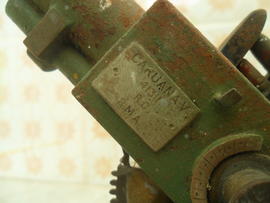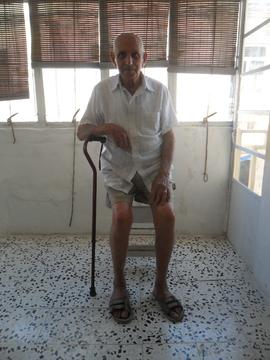In the fifth part of the interview, Vincent 'Censinu' Caruana described the sanitation at Siggiewi, the lack of medicine and doctors, Mussolini's death, the prisoners of war incarcerated in Malta and his demobilisation from the army.
In the fourth part of the interview, Vincent 'Censinu' Caruana continued by mentioning the arrival of the convoys to Malta, the arrival of Spitfire aircraft and the heavy resistance the anti-aircraft gunners had put up against the German and Italian bombers. He explained how Fascist Italy had surrendered on 8th September 1943 - the day of Our Lady of Victories - and finished by mentioning the Victory Kitchens.
In the third part of the interview, Vincent 'Censinu' Caruana started by recalling conscription and how he had been drafted into the army. He had to undergo medical tests and mentioned how the food provided to servicemen was much better than that available to civilians. He talked about life in the army - he had been assigned to 22 Battery, 3 LAA Regiment, Royal Malta Artillery (R.M.A.) - mentioned different diseases and talked about how he had suffered from scabies.
In the second part of the interview, Vincent 'Censinu' Caruana started explaining how refugees (including his family) had been welcomed in Siggiewi. He had to get accustomed to the new conditions in a rural setting, far from home. He talked about the pre-war situation, the arrival of anti-aircraft guns, the plight of the internees, the sirens and the people's interactions in the shelters.
In the second part of the interview, Vincent 'Censinu' Caruana continued by talking about the lack of contact with British servicemen and the numerous colonial soldiers which were stationed in the Island. He described the air raids, Operation Pedestal and the Convoy of Santa Marija and his demobilisation from the army.
In the first part of the interview, Vincent 'Censinu' Caruana started by going on a long monologue. He talked about the pre-war political situation by mentioning Neville Chamberlain, Adolf Hitler, Benito Mussolini, the Italian conquest of Abyssinia and the German occupation of Austria. He talked about the capitulation of France and how the Italian declaration of war by Mussolini was perceived in Malta. He remembered the first air raid, his family's hasty relocation to Siggiewi and the introduction of German bombers in January 1941.
In the first part of the interview, Vincent 'Censinu' Caruana explained how he was conscripted into the army in the summer of 1941. He described the drills practiced, the duties gunners had to attend to on the anti-aircraft guns, the bombardments and cases of thefts and pilfering by soldiers.
Vincent Caruana was conscripted into the Royal Malta Artillery (R.M.A.) in August 1941. In his second interview, he discussed how and where he had to report, his training and, among other things, the soldiers' and gunners' rations. He finished by talking about the Pedestal convoy and the surrender of Italy.
Vincent Caruana and his family had left Senglea for the safety of Siggiewi in June 1940 when the first Italian air raids had been carried out. He described the evacuation process and resettlement in a new village in the countryside with emotion and lucidity. He was later conscripted into the Royal Malta Artillery (R.M.A.) and also talked about his time in the army, the shelters, the internees, the arrival of the Pedestal convoy and the capitulation of Italy.
Theme: Experiencing war - survival, shelter and food. Vincent 'Censinu' Caruana was born on the 30th of June 1922 in Senglea. He had two sisters and four brothers. His father was a tool and coppersmith at the Floriana power station - where Censinu also worked as a mechanical fitter for 41 years before retiring in 1978 - and his mother had been a housewife. He had 1 boy and 1 girl.

